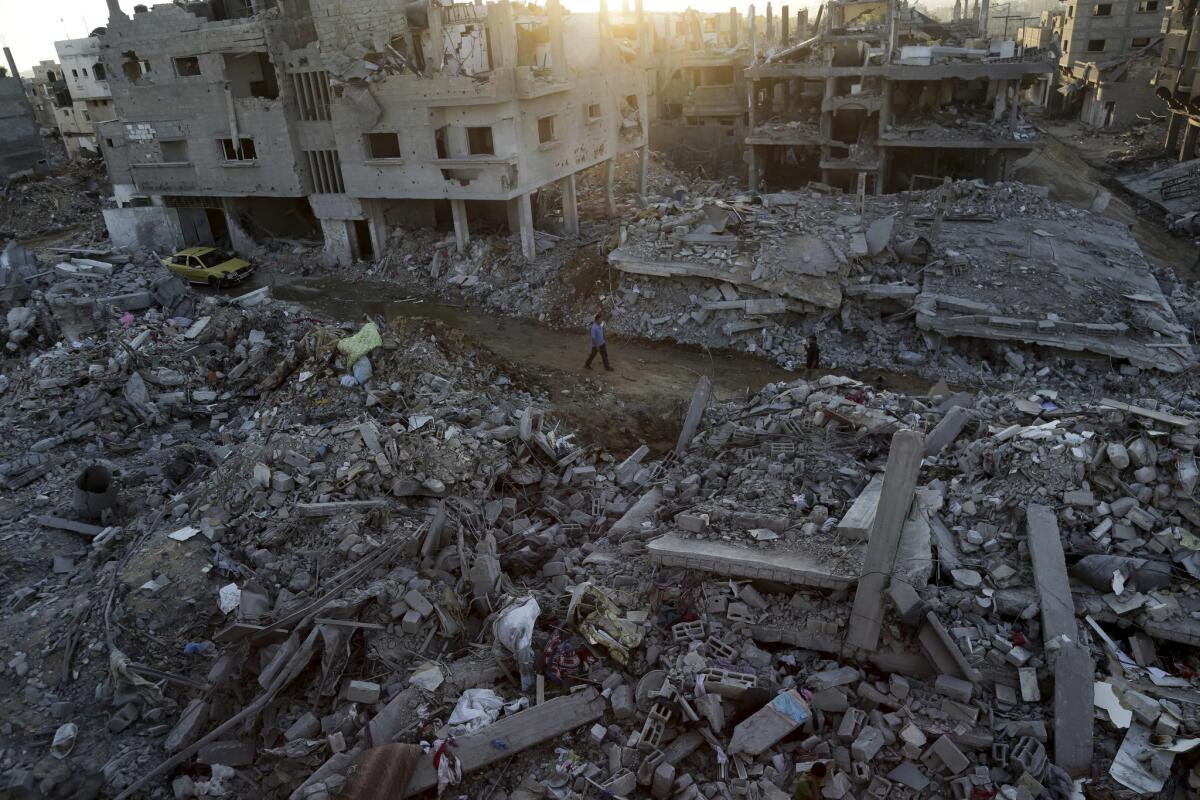Gaza truce holds up for 2nd day as talks continue in Cairo

- Share via
Reporting from Jerusalem — The truce between Israel and militants in the Gaza Strip held Tuesday for the second day as Egyptians continued to mediate indirect talks aimed at a more lasting cease-fire.
Official information about the talks was scant. Progress was being made but gaps remained wide, Azzam Ahmad, who leads the Palestinian delegation to Cairo, told Israeli news media. “There’s a possibility that we’ll reach an overall full agreement, but we still have a long way to go.”
With the 72-hour truce past mid-point, the chances of reaching an accord by Wednesday night and what would happen if the cease-fire lapsed without an agreement remained unclear.
In a Facebook post, Mousa abu Marzook, a Hamas leader, called negotiations difficult and serious but said this was “the second and last cease-fire.”
During a visit to a naval base, Israeli Defense Minister Moshe Yaalon said his nation’s military operation was not over and violence could resume.
Israel has signaled that it would accept an extension of the truce but repeatedly has said it will not negotiate under fire.
Hamas demands that both Egypt and Israel open border crossings to allow free flow of goods into the isolated Gaza Strip. Israel demands an end to rocket attacks and a strict mechanism ensuring that dual-use materials do not reach militants.
According to Israeli and Palestinian news reports, the discussions revolve around easing but not entirely lifting the blockade.
Israel reportedly would agree to double the number of trucks transporting goods into Gaza, expand the fishing zone to six nautical miles into the Mediterranean Sea, increase the number of permits for Gazans to enter Israel through the Erez crossing and scale down a “no-go” security perimeter along the Gaza side of the border fence.
Observers noted that the reported Israeli position did not meet the minimum of Hamas’ demands.
Sources close to the talks said Israel would not object to money going into Gaza to pay tens of thousands of civilians who are employed in Hamas-run offices and have not received their wages in months. In addition, Israel appeared willing to negotiate to retrieve the remains of two soldiers killed during the weeks of fighting in Gaza, but reports suggested Hamas wished to negotiate that issue separately.
Israel has shunned the new Palestinian government formed after a political reconciliation in April between Fatah, which has long controlled the Palestinian Authority, and the militant Hamas movement, which has held sway in Gaza since 2007. Israel claims the new government is in effect backed by a terrorist organization.
However, Ahmad said that “the period of Hamas rule in Gaza is over” and urged Israel to cooperate with the new government that now would be the sovereign authority in Gaza, though in reality Hamas remains in control.
Egyptian authorities appear to be making the opening the Rafah crossing between their nation and Gaza dependent on the deployment of the Palestinian Authority presidential guard to monitor the crossing. Egypt and Israel appear keen to see a gradual return of the historically more moderate Palestinian Authority to Gaza.
Earlier Tuesday, Israeli Prime Minister Benjamin Netanyahu canceled a meeting of his security Cabinet that had been scheduled to discuss the developments in the Cairo talks. Instead, he summoned several senior ministers, including Justice Minister Tzipi Livni and Foreign Minister Avigdor Lieberman, for what local media described as one-on-one “prep talks” before a possible agreement.
Netanyahu also was set to talk to Economy Minister Naftali Bennet, who took to Facebook on Tuesday to slam the emerging agreement, especially reports that Israel would agree to the payment of Hamas employees. Bennet urged Cabinet members to oppose what he called a “protection racket,” which he termed “pay now -- we shoot later; don’t pay -- we shoot now.”
Sobelman is a special correspondent.
More to Read
Sign up for Essential California
The most important California stories and recommendations in your inbox every morning.
You may occasionally receive promotional content from the Los Angeles Times.













